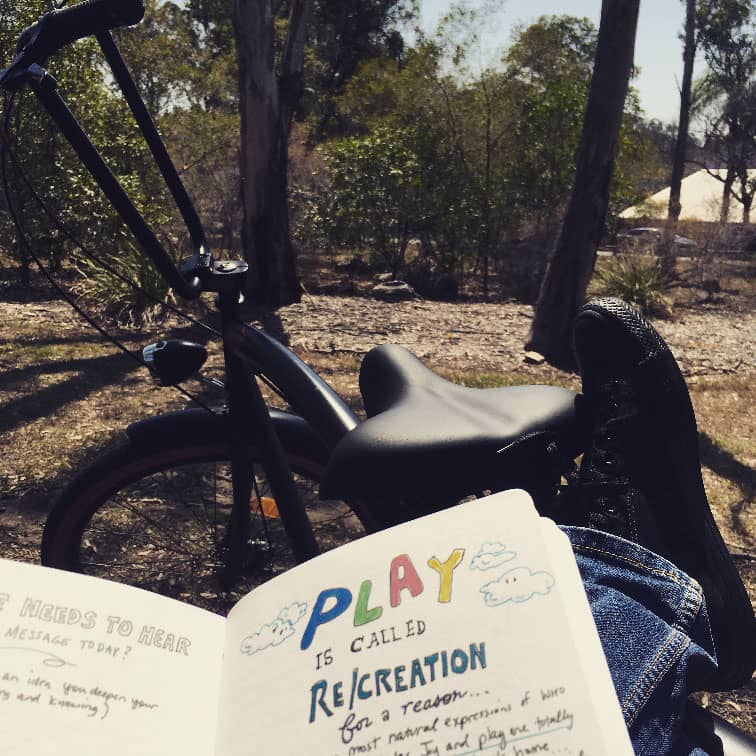Podcast: Download
Subscribe: Apple Podcasts | RSS
 The days rush by, don’t they?
The days rush by, don’t they?
And it can be hard to remember what exactly happened.
Worse…
Forgetfulness about your own life is not only frustrating, but it’s downright painful.
You know what?
It should be.
Because if you’re not actively keeping a journal, then you’re missing out on a simple technique that is guaranteed to help you remember more.
At least, that’s the attitude I’ve taken when I’ve mistakenly neglected journaling across my career as a professor and bestselling author.
When I keep focused on journaling about the events of my life so I can remember them better, however, many benefits unfold.
Let me cover some of them, including the scientific findings, before we dive into the exact process I recommend.
The Benefits Of Memory Journaling
Journaling is truly one of the simplest things you can do to remember more about your life.
It’s not only fun and rewarding. It can also make you more productive on top of providing psychological, emotional and cognitive benefits.
This might seem like I’m promising the moon, but researchers have validated these benefits. In this study, journaling the events of your life was shown to improve the immune system.
Matthew Lieberman and his fellow researchers have shown that expressing feelings in your own words improves mood.
It’s not just the scientists that have proven the benefits either. James Clear talks about it a lot in Atomic Habits – a book for which he has even released engraved pens to help encourage and inspire people to journal more.
How to Keep A Memory Journal
Now that you know the benefits, how exactly do you journal – specifically for memory?
These are the steps I’ve followed for years.
One: The Exact Journal Probably Doesn’t Matter
Some people say that if you choose a quality journal, you’ll take the daily task of writing down your thoughts more seriosly.
I belief there’s truth to this kind of framing effect. And when it comes to the “snapshot journals” I keep, I do use high quality journals.

But not always.
In my experience, it’s the act of journaling itself that matters.
Most especially that the journaling is done consistently.
Don’t worry if that sounds hard. If you can get yourself over an initial period of daily journaling, you’ll develop procedural memory around the task. This means that you’ll find yourself journaling automatically, as a matter of habit.
Two: Set Your Memory Journaling Goals
Although I’m a firm believer in keeping my own memory journal every day, that might not be the right goal for you.
I’m actually quite successful at it, but nothing is 100%. I would say that perhaps 5-10 days a year, I’m just not able to make it.
For yourself, once a week might be best. In fact, there’s an argument to be made that less is more.
If you think about memory journaling in terms of autobiographical memory, for example, you stand a chance to get more episodic memory exercise by challenging yourself to cover 3-5 days at a time.
Again, it’s ultimately up to you. For best results, pick a goal, explore it for awhile and then try another. As experienced memory athlete Tansel Ali has pointed out, varying how you test your memory provides much stronger results.
Three: Decide What You Will (And Will Not) Include
Sometimes I wince when I read old journals. I wonder, “Why on earth did I ever want to remind myself of that?”
Over time, I’ve learned to be more selective. In my case, rather than recording my emotional reactions, I stick more and more to the facts.
That way, I can think objectively rather than subjectively about what happened after some time has passed.
You might be different and wish to remember more of your specific emotions. That’s okay too.
My point is to decide in advance the kinds of details you actually want to remember better and encounter later when reviewing your journals.
Four: Structure Your Memory Journal
Do you really have to journal from the beginning to the end?
Not me.
I’ve get many of my journals back-to-front. One reason is that I’ve practiced dual-handedness to see if I can become fully ambidextrous as a form of memory exercise.
Other times, I use different sections of a journal to test my memory. For example, when memorizing poetry, I find it useful to test in my journal. To avoid cramming these tests into my daily flow, I put them in a separate section of the journal I carry with me.
Five: Protect Your Privacy
Did you know that people used to write their journals in code to prevent authorities from finding out what thoughts they were keeping? There’s even a medieval guide called the Stenographia which includes instructions on how to code your thoughts to keep them private.
These days, you probably don’t have to go that far. If you’re journaling digitally, you can password protect the file.
Or, you can lock your journal in a safe. Perhaps you can find a private place to hide it.
I suppose you could write it using invisible ink too. But perhaps one of the best ways to hide what you’re doing is to simply not tell people that you keep a memory journal. Chances are no one will look for it if they don’t know your journal exists.

Six: Maintain Consistency With These Tips
I’ve talked about how to keep consistent. Let’s look now at ways you can make that happen.
- Set a regular time
- Keep the journaling sessions short
- Treat it like a ritual (i.e. start with a breathing or visualization exercise)
- Carry a smaller “sub-journal” with you
- Be flexible and kind to yourself if you miss a session
- Celebrate milestones
Seven: Journal Your Dreams
We often only journal our waking life memories.
But I’ve found incredible value from writing down dreams.
For one thing, it is a powerful memory exercise, comparable to these memory games you can play with your childhood.
The practice of dream journaling expands your sense of time.
Why?
Because dream journaling expands your awareness of how time passes while you sleep.
There’s an entire course about remembering your dreams in the Magnetic Memory Method Masterclass if you need more help.
But even if you don’t go through all that training, here’s the thing:
If you just commit to writing down your dreams, you’ll be amazed by what will happen in your life.
And if you can’t remember any dreams, don’t worry. Write that down. It’s as simple as one sentence: “I didn’t remember any dreams.”
Believe it or not, that simple exercise typically helps people remember dreams.
Eight: Keep An Audio Or Video Journal
If you absolutely cannot imagine writing daily to journal for self-improvement, you do have alternatives. For example, you can:
- Get a device that records video and/or audio
- Press record
- Let it all out verbally
To give you an example of how easy this form of memory journaling can be, i’ve made made that quick example video for you:
Nine: Use A Memory Journal To Help Complete A Language Learning Goal
Another powerful way to benefit from a memory journal is to use it as part of learning a language.
For example, I love The Freedom Journal for language learning. It makes it easy to set goals and track progress.
But even without such a tool, all you have to do is:
- Set a weekly goal
- Gather the words and phrases you want to memorize
- Show up daily
- Review using a specific process we teach here on the site
- Rinse and repeat
It’s a lot of fun, and helps you see your progress in your own handwriting. This simple artifact leads to more accomplishment while creating pride and confidence in your skills and abilities.
Are you down with one of these daily journaling techniques?
If so, just get started. I guarantee that you’ll remember more about your life and, yes, be more productive.
And if all that weren’t enough, I invite you to learn how to improve your memory even more by completing this free course:
It’ll show you how to create and use a Memory Palace so you can learn, memorize and recall anything in a way that is simple, easy, elegant and fun.
Till next time …
Keep Magnetic! 🙂
Related Posts
- 3 Blazing Fast Ways To Increase Memory Retention
Memory retention... what the heck is it? Is it worth worrying about? If so, can…
- Nelson Dellis On Remember It! And Visual Memory Techniques
Looking for visual memory techniques? And I mean truly visual. In this episode of the…
- How to Remember Concepts: 5 Steps To Mastering Complex Ideas
Remembering concepts feels like the hardest thing on the planet to do. Keep these principles…






2 Responses
Hey Anthony,
Great post! I’m the worst at remembering things so keeping a journal could be really beneficial for me – thanks for all the tips. Since there’s so much other buzz going on from the moment you wake up, making it a habit – and an easy habit – should be a priority. For example, I’m a keen user of Evernote so one way of approaching this could be to create a specific folder in Evernote for a journal. Writing for 5 minutes every day rules out almost any excuse 🙂
Your Evernote idea sounds like a great plan, Camilla. You could also set your smartphone or use notifications on your computer to automatically prompt you to take this action as well.
Enjoy the transformations this will make for you!